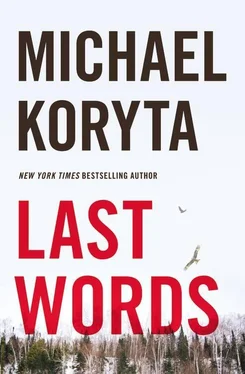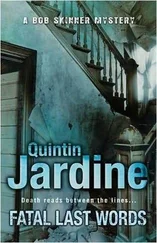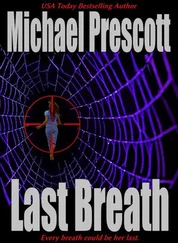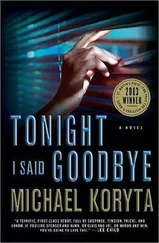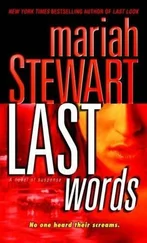“You’re going to need to think about her at some point, Novak! You’re not going to be able to keep walking away from her. Too many people have for too many years!”
It was a relief to slam the door on the sound of that voice. Ridley was visible in the side-view mirror, standing there in the bloody snow, still babbling about Sarah Martin. Mark started the engine and pulled out of the yard.
He made it three miles before his hands started to tremble on the wheel. A mile beyond that and there was a shudder in his vision, and his head felt high and spacey. There was no shoulder to the road, just the fields, and he pulled off into one and put the car in park and got the door open and placed one hand on the snow-covered ground and gasped in air and waited for the rise of vomit in his throat.
It never came. The frigid air filled his lungs and cleared his head, and the feel of the earth brought the high dizziness swirling back down.
When it was done, he hung on the door frame and breathed in the cold air. There was blood on his shirtsleeve and the back of his hand. He wiped at his face, soaked in sweat despite the temperature, and then fell back into the seat, leaving the door open, and looked at himself in the mirror. His usually tan skin looked gray, waxen, the dark circles below his eyes standing out starkly.
Can’t have that, he thought, staring at his own face. Can’t go there again.
If Ridley wanted to make a call to the police right now, Mark would be in jail by the end of the night, and an already bad story would spiral into something far worse. He hadn’t wanted it to go that way. He’d wanted to confront him, yes, get something from him, and Ridley was the type who called for intimidation, but the rope had been enough, and things should have stopped there. It was that smile, the way Ridley Barnes had looked at him, like he was enjoying the game.
So much time had passed since he’d allowed a lapse like that. But then the old feeling had knocked, and he’d known what waited on the other side of the door and still he’d opened it and welcomed the familiar visitor in.
The first time he’d gone looking for blood — his own or someone else’s, it didn’t matter — was nine months after Lauren was killed, and Mark had just gotten off the phone with her father, just finished summarizing another week of no answers and no leads. He’d gone directly to the worst bar he could think of, the one where he could count on a chance. He hadn’t needed to wait long. All it took was the right kind of stare to the right kind of man, and things got started fast. The guy needed to be right, though; he couldn’t be just any guy. He had to look the part, had to come straight out of central casting.
He had to look like he might have killed a woman.
Jeff London had bailed Mark out of jail after talking with a prosecutor who’d said that he understood, who’d said that Mark was damn lucky the other guy had been a piece of shit with a bench warrant out for him or things would have gone different.
You’re shaming her, London had told Mark. His eyes held a sheen under the streetlights. Forget about yourself. Forget about me. You’re shaming her, Mark.
It was so close to those last words Mark had offered Lauren: Don’t embarrass me with this shit. Then came London: You’re shaming her, Mark.
People had their pride. Even the dead.
Or they should have it.
He used handfuls of snow to scrub the blood from his skin and shirt as best he could, and then, as the Midwestern wind picked up and whistled over the fields, he closed the door and got back on the road.
The snow had begun to fall again, fat, wet flakes, and Mark remembered the sheriff’s assertion that some forecasts were calling for as much as ten inches. He hadn’t seen a plow or a salt truck yet, but that wasn’t saying much, because he hadn’t seen any vehicle until a white Chevy Silverado rattled up behind him. The truck would have stood out even on an interstate, though — the muffler had been modified to enhance the growl of the engine. The driver was pushing it hard, rode right up on Mark’s ass, and Mark considered tapping the brakes to screw with him, but the last thing he needed right now was a fender bender that would roll out a deputy. He put the window down, letting snow blow into the car, and waved his hand, calling for the truck to pass him.
It didn’t pass. Just stayed planted. Mark could see that there was only one occupant and that he was wearing sunglasses, which was logical, of course, because the sky was the color of an old nickel.
They went another half a mile and the truck stayed on his ass, and Mark began to understand the situation. He’d been right in his assessment that Ridley wasn’t going to call the police to deal with Mark. That didn’t mean he hadn’t picked up the phone, though.
The snow was blowing harder, and the powder was coating the road quickly. Every now and then, a gust of wind strong enough to buffet the car came across the fields. Up ahead, where the fields ended, trees loomed, rows of tall hardwoods with bare canopies shifting in the wind.
A stop sign came up, surprising him, not just because he’d been distracted by the truck but because visibility was so poor. When he hit the brakes, the Ford fishtailed. The stop was a four-way intersection, but Mark saw no reason to divert from his plan to return to town, so he drove on. Within a few seconds, something felt wrong. There’d been a change in sound. The growl of the Silverado had faded. For an instant he thought perhaps he’d been mistaken, that maybe the truck’s driver had no interest in him at all and had turned in another direction. Then he looked in the mirror again and what he saw almost made him press the brake. The truck was in the middle of the intersection, the driver executing an awkward three-point turn.
Called off? Satisfied that I’m headed back to town?
The truck didn’t finish the turn, though. Once it was broadside in the middle of the road, blocking both lanes, motion stopped, the brake lights went off, and the hazard lights went on.
What in the hell was this about?
Mark kept driving, but the mirror had his attention. The truck remained in place, hazards blinking, as if there had been an accident that forced it to stop there in the road. There’d been nothing of the sort, though. The driver had come to a stop and then carefully turned the truck into that position, which achieved nothing except to...
Block the road.
You didn’t block the road behind someone because you wanted to see where he was going. You blocked the road behind him so somebody else ahead of him would have time with him.
Through the blowing snow, another vehicle appeared. This one was headed east, toward Mark, driving with the wind, seeming to be pushed by the snow. A white panel van. The van slowed and pulled sideways, cutting off the road in front of Mark in an identical fashion to the truck behind him, which was no longer visible in the mirror. The road was completely blocked now, eastbound and westbound, and Mark was alone in the middle.
Mark brought the Ford to a stop. The van doors opened on both sides and two men climbed out. Both wore jeans and hooded sweatshirts and black masks. Both carried shotguns. Behind Mark there was the sound of another door. The truck’s driver was out. He also wore a mask and carried a shotgun.
My guess is that you don’t have too many friends, Mark had told Ridley Barnes.
He had at least three.
The men walked toward Mark, shotguns pointed down, closing the gap fast. Then they fanned out, leaving the road so they were protected by the trees, their guns raised in shooter’s stances.
Читать дальше
